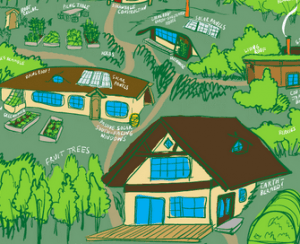Danish organisations introduce Ghana to Ecovillage Design
 Four Danish organisations have jointly organised a four-week intensive training course aimed at building the capacity of community leaders, civil society organisations and institutions in sustainable development approaches.
Four Danish organisations have jointly organised a four-week intensive training course aimed at building the capacity of community leaders, civil society organisations and institutions in sustainable development approaches.
They are the Danish Ecovillage Network, the Danish Civil Society Fund, Danish Ecovillage Association and GAIA Education, all based in Denmark.
The training is on the Ecovillage Design Education (EDE) the first of its kind to be introduced in Ghana and it was hosted by the Ghana Permaculture Institute and Kumasi Institute of Tropical Agriculture (KITA).
The EDE is a new educational system that has been approved by the United Nations Education for Sustainable Development that would promote approaches which would ensure sustainable care for the earth, people, lifestyles and fair share of resources.
Mr Lovans Owusu-Takyi, a Lecturer at KITA and Secretary to the Ghana Ecovillage Network (GEN), in an interview with the Ghana News Agency, at the end of the course, expressed regret that Ghana’s current development paradigm had been exploitative of the earth’s resources.
He said this approach had globally caused destruction to the environment and brought conflicts over the scarce resources resulting in global challenges such as climate change, deforestation, food shortages, nutritional deficiencies, energy insecurity and unsustainable waste management.
Mr Owusu-Takyi said the EDE, therefore, was an internationally certified education programme designed to build the capacity of community leaders to live and promote sustainable lifestyles, while implementing Ecovillage strategies for community development.
He said the participants were thus trained in five dimensions of sustainability, which were an integral part of the Ecovillage development.
They are the Social, Cultural, Economic, Ecological and Participatory Designs, in addition to how they could transition traditional communities into Ecovillages.
He said: “The participants committed to implementing food sovereignty, seed banks, bee-keeping, solar energy, tree planting, sanitation and waste recycling, green building, among others, to enable them to integrate into their communities to ensure clean environments as well as biodiversity conservation.”
Mr Owusu-Takyi urged the participants to take the necessary action to develop their communities and households and to advocate for the integration of eco-strategies to ensure sustainable development and lifestyles.
Madam Camilla Nielsen-Englyst, the Secretary-General of the Danish Ecovillage Association, expressed the hope that if Ghana embraced the EDE system it would empower community leaders to make policies that would ensure that people lived sustainable lifestyles and promoted development.
She said the EDE programme was a partnership intervention to build the capacity of their Ghanaian counterparts of Ghana Ecovillage Network to be able to advocate for Ecovillage strategies into national policy to develop communities.
Madam Nielsen-Englyst, therefore, urged the Government to adopt the Ecovillage system to achieve the Sustainable Development Goals (SDG), adding that; “In Senegal for example, a Ministry of Ecovillage has been established to transition 14,000 traditional villages into Ecovillages.”
Mr Charles Katere, a participant who spoke to the GNA, said anyone who got the chance to be educated in the EDE system should not hesitate in implementing it since it was an important course for community leaders today.
Participants were later given practical tools such as Conflict Resolution Project Design, Leadership and Facilitation Skill, and Ecological Tools, such as renewable energy, organic farming, among others.
Source: GNA
